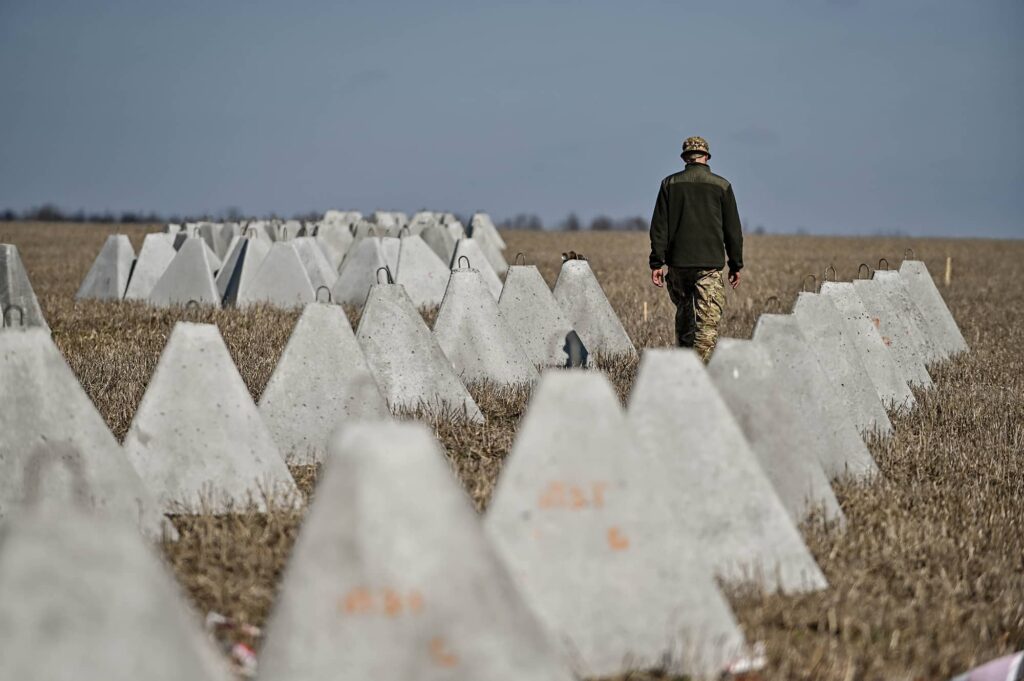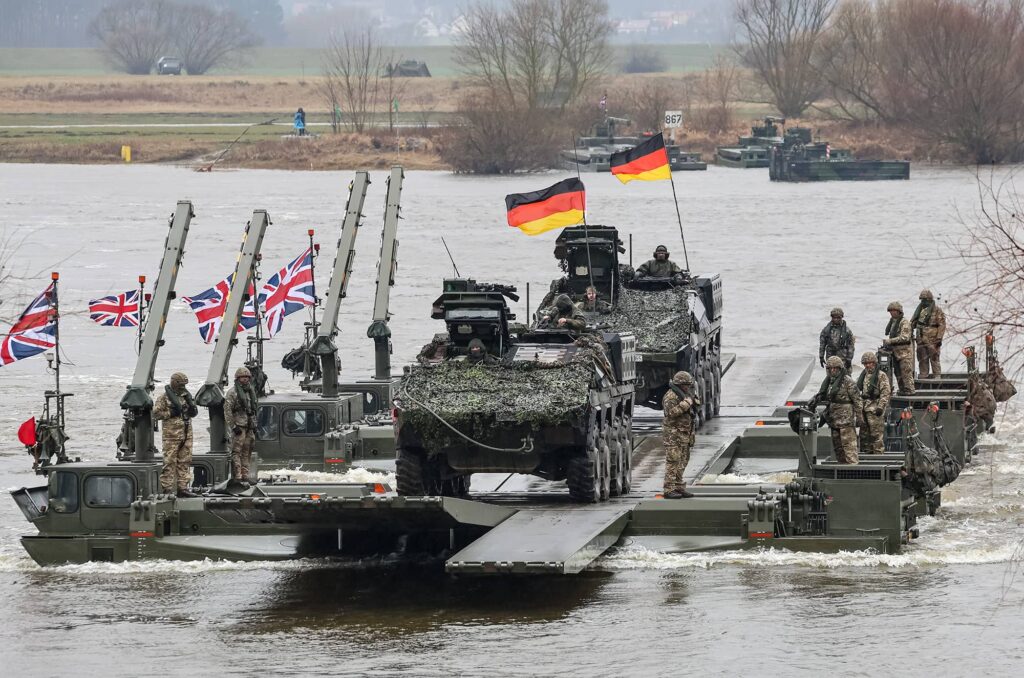The American general Maxwell Taylor wrote a book published in 1960 under the title “The Uncertain Trumpet” about American defense complacency in the Cold War. It triggered a change in strategy. The trumpets of Jericho brought down walls. Today, a trumpet is needed to break through Europe’s walls of inertia and a comfortable “business as usual” mentality.
Europe Today
Reflections on European security must begin with the actual conditions. The continent has been living with the reality of a war on its soil since 2014 and yet Europe, and Germany in particular, have irresponsibly neglected security. The focus has been on cooperation based on trust. Putin’s announcement of conflict in Munich in 2007 was not taken seriously. His annexation of parts of Georgia in 2008 and of Crimea in 2014, and then eight years of war in Donbass were met by the West with ineffective instruments and acts of appeasement. For the sake of its own well-being, the West devalued the central element of the European order: no forcible change of borders.
The shameful withdrawal from Afghanistan in 2021 then showed Putin that the risk he would incur should he attack Ukraine would be low.
Today, Europe is not capable of defending itself against a Russian attack without American support. Russia may not be capable of such an attack at present, but it could be better positioned in around five years’ time, after compensating for the considerable personnel and material losses in Ukraine. In addition, despite British and French nuclear weapons, NATO depends on the nuclear protection of the US. This applies even more to the European Union, which at best has limited military capabilities.
Only NATO can effectively protect Europe, provided that America provides unrestricted support. While this is currently the case, the question of US support for Europe’s defense will have to be answered anew after the US elections in November.
A key condition for continued US support is that the Europeans contribute more to the common defense. There has been some improvement in the past ten years. Today, 18 out of 31 NATO countries are fulfilling their commitment to spend 2 percent of gross domestic product (GDP) on defense. This means, however, that almost half of European governments have not yet understood the seriousness of the situation. Significant gaps remain in armed forces, critical infrastructure, defense industrial capacity and the logistical ability to serve as a hub for transatlantic reinforcements. Total spending at more than 2 percent will therefore be required for at least ten years.
For Europe, the time of cooperative security is over because its prerequisite – mutual trust between Russia and NATO – has been destroyed by Putin. Nevertheless, it is not yet understood in Europe that confrontational security is required now. Only then can one try to rebuild trust with Russia. Over the long term trust is necessary because the democracies of Europe are located on the same continent as Russia, and it will remain a power owing to its nuclear weapons and wealth of raw materials.

The Indispensable Transatlantic Alliance at Risk
The US presidential election on November 5, 2024 could influence Europe’s security architecture. If Donald Trump wins, he will not be able to withdraw from NATO – even if he wishes – because the annulment of a binding treaty requires an unattainable two-thirds majority in the Senate. But he could make the American commitment – and above all, the irreplaceable and critical nuclear guarantee – dependent on whether Europe, especially Germany, achieves the defense spending target of two percent of GDP.
At the same time, Europe’s geostrategic importance for America remains unchanged. Without a hold in Europe, America cannot easily project power into the critical spaces of the Middle East, Africa, and the Indian Ocean. Thus, although American protection helps Europe, it also serves the strategic interests of the US in providing a base for American projection of power and security.
The Near Term Outlook
Doubts about the American security guarantee could encourage Putin. Europe and Germany must therefore be prepared for the fact that Russia could wage limited wars on Europe starting from 2025/26 at the earliest, even if it could hardly launch a major attack on all European NATO states before 2029/2030. However, even a limited Russian success in the Baltic states could mean the end of NATO, would make Russia the dominant power in Europe, and would likely trigger domestic political upheavals towards illiberalism in almost all European states, including Germany. The goal of a buffer zone or “cordon sanitaire” protecting Russia would thus be achievable for Putin, and the dominance of the US on its European opposite coast, indispensable for America’s global importance, would be gone.
This is the core of the political challenge facing the West in 2024. It will be decided in Ukraine, which must therefore be supported even more resolutely. It must not be allowed to lose, and it will have to be rebuilt in the long term to give its people confidence in a better future.
Ultimately, Russia’s economic power is not much larger than that of Italy. Europe thus can face up to the challenge, provided it remains united, recognizes the danger, shows the strength to act now, and wins over its citizens.
Europe must protect its periphery and create as much independent defense capability as possible. This is Europe’s best protection against the uncertainties of the American election. Fulfilling NATO commitments is the first, unavoidable step in this direction. How Germany can achieve this and whether it can maintain the current ratio of investment to consumption expenditure in the federal budget is the unresolved political question in Germany, Europe’s keystone country.

Needed European Security Steps
Germany and Europe must now achieve not only the technical spending goal of two percent, and probably more, but also what it means in policy terms: to become defense-ready again and to maintain nuclear-sharing. This includes a limited projection capability to the periphery of Europe – to the east, south-east, south and into the Arctic Ocean, which is becoming ice-free. It is strategically impossible to defend Europe without control of the North Atlantic, which requires strengthening navies and air defenses. At the same time, Europe should dismiss unrealistic ideas such as a European army and an independent European nuclear deterrent.
Defense readiness means deploying European components of NATO in all five dimensions of modern warfare – land, air, sea, space and cyber – throughout the entire NATO area and its periphery, making them operational and taking advantage of emerging technologies such as AI, quantum computing, bionics, and robotics.
In addition, European armed forces must be ready to assist in disasters worldwide, and in conflicts where the US expects European support, such as in securing the sea lanes in the Indo-Pacific. Some of these capabilities, with identical equipment and full interoperability with American and British forces, should be developed as multinational components that could be deployed by the EU alone, but preferably jointly with non-EU assets added by NATO. In addition, endurance and sustainability must be achieved. This applies above all to ammunition stocks, which must be available for at least 30 days.
Visible action in Europe is required; strategy papers are not enough. In addition, guidelines for business and industry must be developed to ensure wartime support in crises.
The Long Term Outlook
The development of our world will be determined in the long term by the competition between America and China, a competition between democracy and autocracy. The emergence of a new bipolarity is more likely than the often-mentioned vision of multipolarity. Russia, Europe and India will be essentially regional actors, despite their partial global influence.
Europe’s role is limited, above all because the EU is and will remain divided. The lack of agreement between Germany and France has deprived the EU of its driving force, Brexit has taken away Britain’s pragmatic power to shape the EU, and it remains to be seen how Poland can bring its growing weight to bear. However, Europe must quickly become capable of acting, possibly through the creation – for a start – of a core group of closely coordinated European powers.
The decisive factor will be the political will of the people to support change and face dangers. Europe’s citizens have gone further than their politicians because they sense uncertainty and insecurity. They now expect their politicians to have the courage to tell them the truth, to propose clarity and goals that they can follow. If this trumpet is now sounded in Europe, then the Americans will once again see the transatlantic bond as important to their future too, a bright, shared future.

